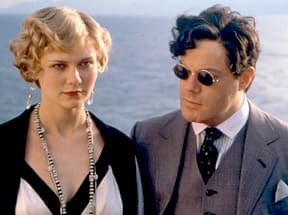"The Cat's Meow" takes as its base a legendary hushedup scandal of 1920s Hollywood and tries to imagine the series of events that led up to it. In November of 1924, newspaper baron William Randolph Hearst hosted an elite collection of Hollywood glitterati - including starlet Marion Davies (Hearst's mistress), Charlie Chaplin, film pioneer Thomas Ince, gossip columnist Louella Parsons, and British novelist Elinor Glyn - for a weekend party on his yacht during which one of the guests died under mysterious circumstances. Hearst's power and virtual stranglehold on the media of the time ensured that the death was never properly investigated or reported on, leaving only rumours and speculation to fester. This film brings to life the most popular of these rumours, which implicates Hearst in the murder as well as the cover-up while in a jealous rage over a suspected affair between Davies and Chaplin.
Much like "Gosford Park" (which director Robert Altman described as a "who cares whodunit"), "The Cat's Meow" is much less a gripping murder mystery than an exploration of the complex social structures and power dynamics that exist within an isolated group of people, though this film lacks the former's broader social analysis. Director and film historian Peter Bogdanovich has created a period piece containing some of the key players in prohibition-era Hollywood which is executed with a great deal of skill and historical accuracy, but is without a relevance that would make it resonate beyond its very contained story. What little it does have to say about the pitfalls of success's excesses has been said elsewhere, better and with more immediacy. For those interested in the period and the players in and of themselves, however, the film's performances are well worth watching. Comedian Eddie Izzard gives depth to the womanising Chaplin, while teen queen Kirsten Dunst more than holds her own among the experienced cast with her emotionally complex Marion Davies and Edward Herrmann does a remarkable job at humanising the notorious Hearst.
Much like "Gosford Park" (which director Robert Altman described as a "who cares whodunit"), "The Cat's Meow" is much less a gripping murder mystery than an exploration of the complex social structures and power dynamics that exist within an isolated group of people, though this film lacks the former's broader social analysis. Director and film historian Peter Bogdanovich has created a period piece containing some of the key players in prohibition-era Hollywood which is executed with a great deal of skill and historical accuracy, but is without a relevance that would make it resonate beyond its very contained story. What little it does have to say about the pitfalls of success's excesses has been said elsewhere, better and with more immediacy. For those interested in the period and the players in and of themselves, however, the film's performances are well worth watching. Comedian Eddie Izzard gives depth to the womanising Chaplin, while teen queen Kirsten Dunst more than holds her own among the experienced cast with her emotionally complex Marion Davies and Edward Herrmann does a remarkable job at humanising the notorious Hearst.
